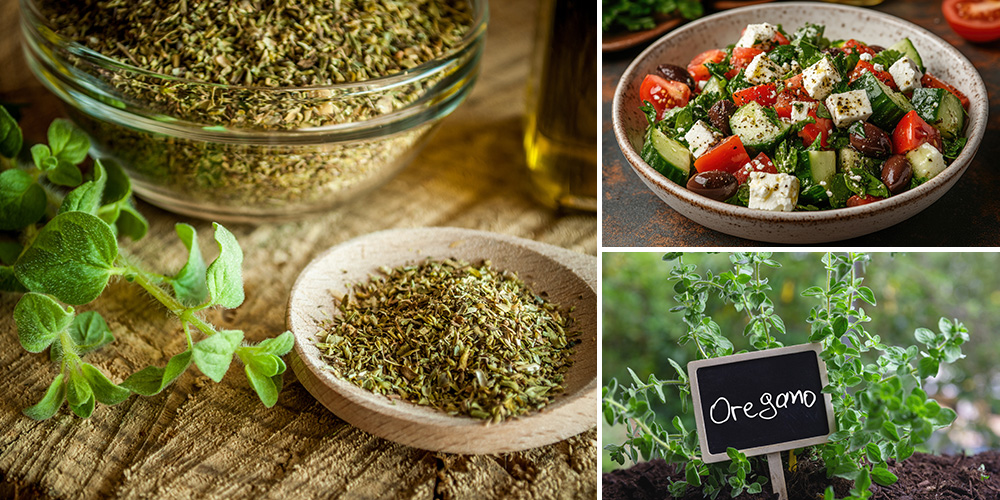
This is What Oregano Does To Your Body
Oregano is one of the most popular herbs used to enhance the flavor of your savory meals. And even though so many people have it sitting in their spice cabinets, they likely don’t know that this herb has a potent history in herbal medicine that carries into the present day. Even more exciting is that modern research has discovered that this herb may be more effective at alleviating common daily ailments and discomforts than most synthetic alternatives. Let’s look at what Oregano does to your body and how you can unlock its benefits with ingredients in your own home!
About Oregano
Oregano grows natively along the hills of Mediterranean countries, but it can also be found in Western Asia and cultivated in areas of the United States and Mexico. It has fuzzy, oval leaves, and it produces stunning clusters of either pink, white, or purple flowers.
While many people delight in using dried Oregano in their cooking for its warm, fragrant aroma, they may not know that Oregano is a member of the mint family (Lamiaceae).
The name Oregano can refer to up to 61 different plant species. However, the type of Oregano you will most likely find in your kitchen has the botanical name Origanum vulgare.
History of Oregano in Herbal Medicine
Oregano has a very long history of medicinal use, dating back to the ancient Greek and Roman empires. Oregano was used to treat ailments from asthma, muscle cramps, indigestion, and diarrhea, and even topically for aches, skin sores, and wounds.
Looking at Greece in particular, oregano infusions were applied with a cloth to help alleviate skin conditions and pain and inflammation in the muscles. In ancient Egypt, Oregano was used to soothe insect stings, preserve food, and even be considered an antidote to poisons.
Throughout Europe, Oregano has been a remedy for digestive discomforts such as stomach aches, diarrhea, and indigestion. To this day, oregano infusion is considered a remedy for gastrointestinal issues but also ideal for soothing colds or respiratory ailments.
Oregano Benefits:
Today, Oregano sits in the spice cabinets of many, but very few people are aware of the unique benefits of this aromatic herb, including the following:
Oregano fights colds, bacteria, and fungus
Many people don’t know that this kitchen herb is an antibacterial, antimicrobial, and antifungal powerhouse. Oregano is most famous for its antibacterial and antimicrobial abilities, which can help to fight off infections and illness and contribute to your overall health and well-being.
This is thanks to two compounds found in the herb: carvacrol and thymol. Oregano has been demonstrated through in-vitro research to even protect from several pathogens such as E.coli, Salmonella, and Staphylococcus.
You can apply Oregano topically as an ointment to help reduce the chances of infection in minor cuts, scrapes, or wounds. It can also help to reduce viral skin infections and even improve healing for fungal conditions such as athlete’s foot, nail fungus, and ringworm.
To apply it topically, you can infuse the dried oregano in a carrier oil, like the olive one.
Oregano Reduces Inflammation
The use of Oregano as an anti-inflammatory in ancient Greece has been backed up by more recent research that found it can block inflammatory cells. This is partly due to the carvacrol and thymol compounds but also to rosmarinic acid found in the oils of Oregano.
Oregano can help reduce muscle aches and pains but also reduce inflammation in the skin, scalp, lungs, and digestive system. This makes it an excellent herbal alternative to over-the-counter NSAIDs or topicals.
You can get relief by consuming the oregano leaves, infusing them with carrier oil or water, and applying them topically to the affected area.
What is even better is that while determining whether Oregano was an effective anti-inflammatory, it was discovered that Oregano does not contain any genetic markers for irritation.
This means that it is less likely to irritate the skin or digestive system, even if you are prone to sensitivities. With that said, it’s still always best to test any herbal product first to avoid an allergic reaction.
All the fast pain-relieving meds out there are doing nothing more than poison you with their lab-made chemicals. All this when nature already provided you with its potent remedies! If you need to quickly fix your inflammation and get rid of that annoying pain with the strongest natural painkiller salve you can find, check this one out. I didn’t believe it worked until I saw the reviews:
Oregano Contributes to Better Oral Health
Oregano’s ability to fight infections and reduce bacteria is also beneficial to oral healthcare. Its anti-inflammatory and antimicrobial abilities can soothe minor infections or inflammation within the mouth or gums and assist with dental issues such as gingivitis.
Many people infuse oregano leaves with water and use them as a mouthwash. You can also infuse it with a carrier oil and apply it directly to affected gums for quick relief.
One study showed that oregano mouthwash effectively reduced halitosis, an oral health condition with a distinct symptom of bad breath. It worked so successfully, likely due to its ability to reduce bacteria and inflammation in the mouth, gums, throat, and stomach, which is often the underlying cause of halitosis.
The researchers even concluded that Oregano could be a safer alternative to common treatment methods without unpleasant side effects.
I used to brush and floss like everyone else, assuming I was safe from oral health issues. But what I didn’t realize was how quickly neglecting the smallest signs—like inflammation or bad breath—could spiral into something far worse. Gum infections, tooth decay, even life-threatening conditions linked to poor oral health can creep up without warning.
That’s why the Amish Ways Book caught my attention. In it, an Amish man reveals how they’ve avoided these dangers for generations using only what they have on hand. Their time-tested methods not only prevent oral health disasters but also tackle issues modern treatments often overlook. This book isn’t just an eye-opener—it’s a lifeline for anyone who wants to avoid the worst. Here’s where you can find the Amish Toothpaste recipe.
Oregano Will Soothe the Digestive System
Another benefit that oregano shares with its mint family relatives is its soothing abilities for all elements of the digestive tract. Not only is Oregano an antispasmodic for the intestines to help reduce abdominal pain and cramping, but it can also help to alleviate discomfort from bloating, indigestion, gas, and flatulence.
Not only that but Oregano is also considered a prebiotic. This means that it helps to support gut microbiome health and promotes the growth of beneficial gut bacteria for better digestive (and overall) health. This is also attributed to Oregano’s antimicrobial abilities.
It’s made by one of America’s top herbalists, and it’s called the Balanced Gut Blend Tincture. I’ve never seen faster changes in my gut, my body, my overall wellbeing ever before. The effects of this tincture are 10 times stronger and faster than the gut remedies I’ve been taking before.
Best Way to Consume Oregano
There are a few ways to maximize the benefits of the oregano herb. A water infusion is the best way to release the volatile oils in the dried oregano leaves. Heat can also activate oregano oils, so consuming it as a tea or in your cooking is another way to ingest its helpful properties.
Drinking Oregano as tea is one of the best ways to enjoy its benefits, particularly for your oral and digestive health. If you hope to alleviate respiratory tract issues, this tea can also help. You can drape a towel over your head with your oregano infusion and lean over your tea to inhale the vapors to reduce inflammation in the nasal cavities and the lungs.
Many people enjoy the savory taste of oregano tea on its own, or they will combine it with other herbs and ingredients to contribute to their overall health and wellness. Once your tea has been infused, you can enjoy it hot or over ice.
Oregano Tea
You can enjoy oregano tea at home in a few different ways since Oregano is quite a prolific grower and is considered a perennial herb up to zone 4 and even zone 5. Many gardeners will grow their own Oregano, which you can harvest fresh to consume as a tea.
You can also dry your Oregano leaves for optimal storage and use them in your herbal tea. But if you aren’t a gardener, the good news is that you can use dried oregano leaves right from your spice cabinet. All three methods offer the same health benefits.
⇒ The 10 Medicinal Seeds You Should Plant for A Complete Pharmacy (Watch Video)
If you keep Oregano in your spice cabinet, it may sound strange to sip it as tea, particularly when most people describe Oregano as “fragrant” or “pungent.” When infused with water, Oregano creates a warm, savory-flavored tea.
I’ve found oregano tea is very gentle on the stomach and provides immediate relief if you accidentally overindulge, struggle with nausea, or experience bloating. It is also naturally caffeine-free, so you can drink it in the morning or before bedtime, and it will not disrupt your sleep.
 Ingredients
Ingredients
- 2 teaspoons of fresh Oregano (1 tsp of dried Oregano)
- 1 cup of hot water (175–180°F)
- A strainer, filter, cheesecloth, or a compostable tea bag
How to Make Oregano Tea (Step-By-Step)
If you’re ready to feel the benefits of this powerful herb, here’s a complete guide on infusing your own oregano tea at home.
Step 1: Prepare your infusion
Bring your water to a boil, and then allow the water to cool to (175–180°F). If you don’t have a thermometer, this takes approximately 10-15 minutes after boiling your water. This reduces the chances of your leaves becoming burnt. During this time, add your Oregano to your cup or tea bag. 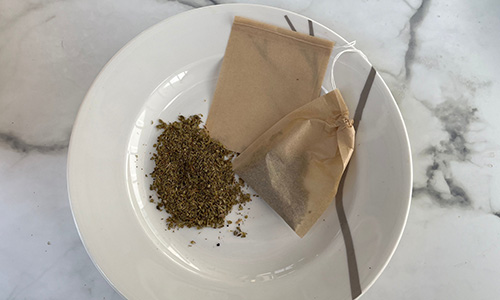
Step 2: Steeping your tea
Once the water has reached the desired temperature, pour it over your tea bag or oregano leaves in your cup or mug. Allow the leaves to infuse for 5-15 minutes. 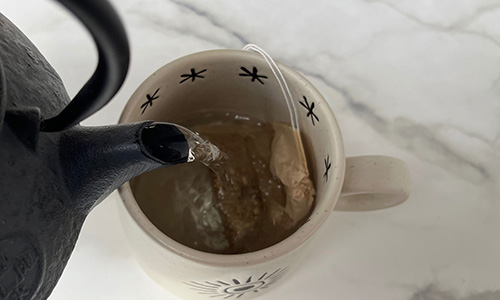
Step 3: Strain and enjoy
Once the tea has steeped, strain the water with your strainer. If you use a compostable tea bag, you can simply remove the teabag and compost it accordingly.
Step 4 (for iced tea only):
If you prefer to enjoy your oregano tea over ice, you will need an 8-oz glass. Give your infusion time to cool to room temperature, then fill your 8-oz glass with ice. Pour your infusion into the glass filled with ice, and enjoy!
How to Store Your Oregano Tea
It’s best to prepare only as much oregano tea as you intend to drink, with the exception of iced tea. Iced tea can be kept in the fridge for up to one week. Store dried oregano herbs in your spice cabinet in a cool, dry location.
Other Ingredients You Can Add to Your Tea:
While oregano tea has a distinctive, savory flavor, you can combine additional ingredients to your taste that will amplify some benefits.
Ginger: Ginger is ideal if you are looking to increase digestive healing, particularly nausea. Ginger is also a powerful anti-inflammatory ingredient. Combining fresh ginger and Oregano in a tea infusion will enhance the flavor of your tea. Ginger is also a potent antioxidant and also has antimicrobial properties. If you add ginger to your oregano tea, you can add 1-2 tsp of fresh ginger to your infusion and steep it alongside your Oregano.
Lemon: Squeezing a fresh slice of lemon into your oregano tea will liven up the flavor of your tea. Lemons are high in Vitamin C, a potent antioxidant, and are also beneficial to kidney health.
Honey: Honey is another antioxidant that also has antibacterial properties. It is a simple way to sweeten your tea without using artificial sweeteners or sugars.
Take Charge of Your Health Before It’s Too Late
Imagine waking up one day and realizing the remedies you need for your health are no longer available. Pharmacies looted, hospitals overcrowded—what would you do? Emergencies don’t come with a warning, which is why The Forgotten Home Apothecary is more than just a book—it’s a lifeline for you and your family.
Inside, you’ll learn how to make remedies like:
- Painkiller in a Jar: Made from wild lettuce, a natural alternative to pain relief.
- Memory Elixir: A rosemary-based remedy proven to boost memory.
- Nature’s Amoxicillin: Strengthen your immune system naturally.
- Herbal Parasite Flush: A simple recipe with papaya seeds, honey, and water to detox parasites.
- Grandma’s Hot Salve for Back Pain: Relieve stiffness with this warming salve.
These remedies and 245 more will equip you with the tools to manage your health naturally, no matter the circumstances. Don’t wait until it’s too late—click here to secure your copy and take control of your health today.
You may also like:

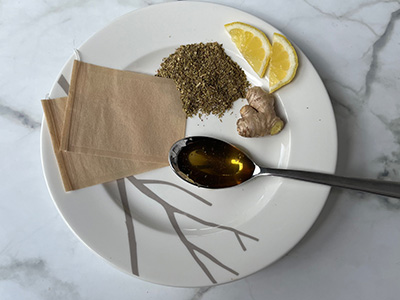 Ingredients
Ingredients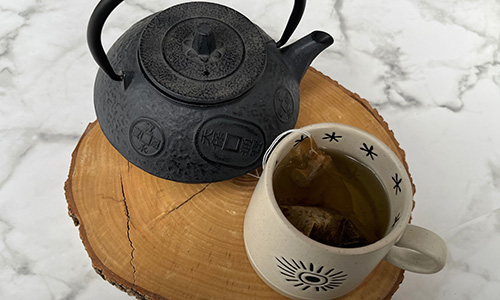
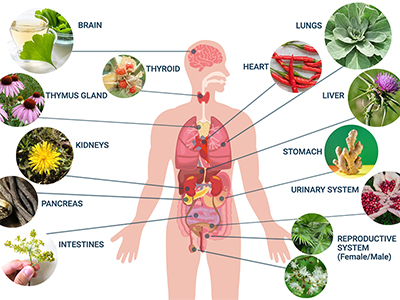
Can you make tea from oil of Oregsno ??
No, it’s oil. Water and oil don’t mix. You make tea from dried leaves or you can use your spice container of oregano, if you have one in the kitchen, because it is just crushed leaves also. You can usually buy it fresh from the grocery stores in the produce section.
Hi I ordered the Book lost herbs, when will I receive it? its been awhile
YOU WONT NEVER GOT MINE ITS BEEN 10 MONTHS OR SO I GAVE UP GOT THE RUN AROUND FOR SO LONG
I also ordered that book a long time ago and I never received it.
I never got mine either… 🙁
I ordered my book, along with others of hers, and received it quickly. Maybe call customer support?
I use oregano as a natural sunscreen! I have to take it daily in capsule form for at least a month but then I don’t need to use all those cancer-causing bottles of sunscreen! We spend winters in Mexico so this makes good sense to me – what do you think?
Oregano is also effective against TB I live in a county where TB was found in the wild deer population, but none of the deer near me had it. I told the department of natural resources that the reason why is that the deer came to eat from my oregano patches, lol. They all showed up at once and then not for a while, like they planned to come and medicate. When my horse had difficulties breathing, she would roll in the oregano patch to release the scent and then fall asleep laying on the oregano. It always amazes me how animals instinctively know that.